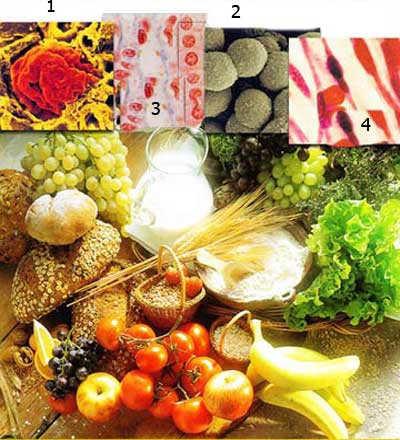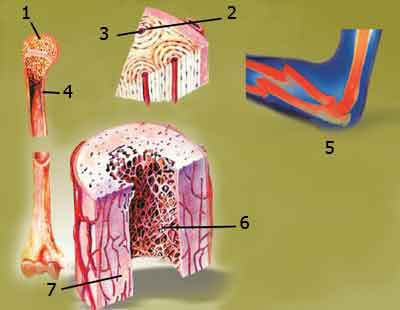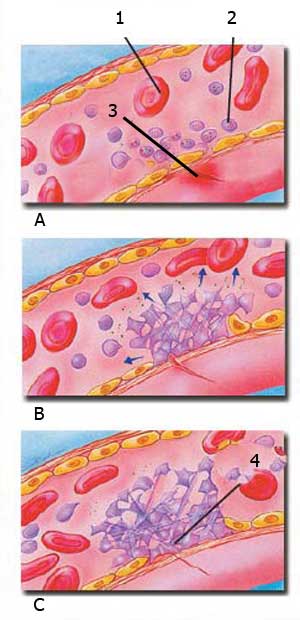The cell is exceptionally sensitive about what substances it will absorb into itself. The cell takes a substance into itself only after determining whether it will be harmful or beneficial. But how does it makes that determination? No doubt, hiding behind an irrational and illogical explanation such as coincidence is a refusal to see the facts.
 |
| The entrance to a living cell is marked by passage through a membrane functioning to keep the bad stuff out, while letting the good stuff in… But who or what comes in and what goes out? — Gerald L. Schroeder |
If someone placed a pile of freshly powdered metal in front of you, how well could you tell whether it was steel, aluminum or some other useful metal? If you also imagine that you made that distinction quickly, and that the slightest mistake could have fatal consequences, then you can better understand the importance of the ability the cell displays. For example, in cases of need or lack, the brain gives orders to the intestine to absorb more iron or phosphorus; and the intestinal cells immediately absorb iron or phosphorus. The exact opposite also applies. In the event of a surplus of any such metals, they are expelled from the cells after receipt from a command from the brain.
 | 1. Kidney cell |
| Each of the vitamins and minerals that enter your body is used by different organs. Red blood cells, for instance, select the iron necessary for oxygen transport from among the metals that enter the body. Liver cells and kidney cells are all different in terms of their needs and the substances they select. This cellular selection mechanism that operates so flawlessly is a clear indication of Allah's compassion for human beings. | |
In a similar way, cells in the kidney identify level of the surplus calcium in the blood and expel that surplus from the circulation. How is it that cells composed of unconscious molecules possess the ability to recognize minerals and adjust their levels in the body according to need? The way that brain cells command the necessary substances to absorb is itself sufficient to refute claims of coincidence. These cells are aware of their responsibilities and give orders. These commands reach the intestinal cells, for example, by means of special messenger fluids. There, the cells obey the order and fulfill their duties flawlessly. Recognizing the iron atoms before them, they duly absorb them.
 | |
| He has given you everything you have asked Him for. If you tried to number Allah's blessings, you could never count them … |
How can these cells possibly engage in such conscious behavior? Where did they acquire the sense of responsibility that will mobilize them for the life of the body they belong to? It's nonsensical to maintain that cells acquired such organized behavior on their own. It is Allah Who flawlessly creates cells, too small to be seen without an electron microscope, and Who creates them in an order. Our Lord's incomparable Creation and infinite knowledge are so evident in every detail of life that no one can conceal them.
 |
Minerals in molecular form are essential for life. Your body needs 15 minerals in order to maintain normal structure and cell functions. The most needed minerals are calcium, magnesium and phosphorus. Other requirements are smaller amounts of chrome, iron, selenium, zinc, copper, fluoride, manganese, molybdenum, iodine, manganese, chloride, potassium and sodium.
Minerals are of vital importance in the way that they constitute components of your bones, teeth, soft tissues, muscles, blood and nerve cells. In addition, minerals assist muscle reactions, the transmission of nerve signals, digestion, metabolism function, and hormone production. 74
Among the inorganic nutrients related to digestion are water, sodium, potassium, chloride, calcium, phosphate, sulphate, magnesium, iron, copper, zinc and manganese. A deficiency in the level of any one will cause functions connected with those minerals not to take place.
Along with playing major roles in biological systems, metals that accumulate also have toxic effects. Therefore, the absorbance of particular metals into the cells, and their storage and expulsion by means of toxin disposal, are all performed scrupulously so that the metals' rich chemistry can be utilized. The provision of the right metals when needed, and the prevention of their accumulating to a potentially poisonous level are of the greatest importance. Many conditions stem from disruptions of the metal ion balance—including anemia, haemochromatosis, Menkes disease, Wilson's disease, nervous disorders such as Alzheimer's disease, Friedrich's ataxia, and Parkinson's disease. Moreover, micro-bacterial infections can easily occur due to defects in metal ion transport.
Supervision of the metal balance is provided by proteins that recognize and transport specific metals. These proteins are able to distinguish the proper metal from among the many present in the cellular environment in higher amounts, and can identify metals whose quantities have declined or accumulated. 75
The Flawless Selections That Take Place in Every Point
in Our Bodies Belongs to Allah, The Omnipresent.
Iodine is used primarily to produce thyroid hormones, which play an important role in the body's metabolic balance, and in the regulating all the biological processes in your body. Iodine deficiency affects the thyroid gland, and thus the working speed of the body's cells. In the event that not enough iodine is absorbed from food and water, the disorder known as goiter results.
This generally occurs in connection with insufficient iodine consumption. But if thyroid cells do not recognize iodine or cannot gather it from the food we eat, then everyone would be faced with that disorder. However, by the mercy of Allah, human beings have been created with thyroids able to select iodine for the regular functioning of their metabolism.
All minerals have astonishingly different duties and effects on the body. The cells recognize all kinds of minerals and permit needed ones to pass the cell membrane. In doing so, they ensure that these minerals are absorbed in the right quantities. For example, if the body needs iodine, the thyroid gland alone recognizes it, and takes in only iodine from among all other metals such as cobalt and phosphorus. Alternatively, the necessary iodine inside the thyroid cells is not removed in error. It exhibits a selection and application, displaying an astonishing consciousness. Yet you are unaware of all this happening. If regulation were to be left to the individual, then you would find it impossible to supervise the system for even a brief moment, let alone for your entire lifetime. Obviously, it's impossible for anyone to maintain delicate balances at great speed without making mistakes and, what is more, to follow this up for every single cell in the body.
The following pages list the minerals essential for the body. Although many are present in the body at the milligram level (or even less, in some cases), they are still of vital importance for health. It's also essential that these substances be present in exactly the right quantities in the body, neither more nor less. This important responsibility is assumed by the cell membrane.
 |
One of the minerals necessary for a healthy body is calcium, which is present in large quantities in the bones. When lacking in substantial amounts, pains in the teeth and back, weakening in the bones, and easy fractures can all occur. The level of calcium in the body is important not only for the bones, but also plays a role in all the body's functions. It is also an essential mineral for the absorption of iron in the body and for nutrients to be able to pass through the cell membrane.
Calcium is also important for cells to perform their functions, the transmission of nerve signals, muscle development and contraction, blood coagulation, and the development of the baby's bones during pregnancy. It also protects the baby from mercury poisoning, prevents kidney stones, reduces the risk of cancer and heart attacks, provides energy, accelerates the activities of various enzymes, breaks down fats for use by the body, and helps the skin to remain healthy.
In his book Nature's Destiny, the microbiologist Michael Denton touches on the importance of calcium for the body:
In biological systems, it is calcium which is pre-eminently used where chemical information must be transmitted at great speed, as in the triggering of muscle contraction, transmission of nerve impulses across the synapse, triggering hormone release, the changes following fertilization, etc. As Williams points out in his review, "Amongst the metal ions available to biology, only calcium can be high in concentration, can diffuse rapidly, can bind and dissociate strongly." Of particular relevance to its role as the "mercury of the cell" is the fact that the chemical characteristics of the calcium ion are perfectly fit for specific association with proteins . . . and, second, because of the particular affinity of calcium ions for oxygen atoms, which are readily provided by the amino acids of proteins ... Proteins in their molecular irregularity and in their possession of readily accessible oxygen atoms provide an ideal molecular matrix for the design of calcium binding sites. 76
 |
| François Despartes (1661-1746) |
This metal protects the body, prevents aging, and also has great importance in treatment processes concerning tissue renewal and skin repair. It also has effects in bone formation, hair and skin color, and the formation of hemoglobin and red blood cells (erythrocytes). Most of the copper in the body attaches to proteins, and plays a role in antioxidant effects, energy production and tissue renewal. But a high intake of copper reduces zinc absorption, and a high intake of zinc reduces copper absorption. Therefore, a delicate equilibrium exists between these two metals.
Research shows that copper deficiency raises the levels of cholesterol and LDL-cholesterol (bad cholesterol) in the plasma, and also lowers HDL-cholesterol (good cholesterol) levels, thus increasing the risks of heart attack.77 Irregularities in copper metabolism play the leading role in Wilson's and Menkes' diseases. Both these genetic diseases occur because of defects in the copper-transporting proteins. The special channels that permit copper ions to pass through the cell membrane are damaged, leading to a fall in copper levels in the liver and brain, and to their rise in the intestines and kidneys. This causes Menkes' disease, resulting in mental retardation and death before the age of three.
A lack of copper also manifests itself in the form of delayed healing of wounds, leg ulcers and mouth lesions, eczema, acne, lines on the nails, restricted growth, weak taste perception, chronic immune deficiency, and the frequent contraction of contagious diseases. 78
 | |
| It is He Who sends down water from the sky from which We bring forth growth of every kind, and from that We bring forth the green shoots and from them We bring forth close-packed seeds, and from the spathes of the date palm date clusters hanging down, and gardens of grapes and olives and pomegranates, both similar and dissimilar. Look at their fruits as they bear fruit and ripen. There are Signs in that for people who believe. |
Iron is an important nutrient necessary for a healthy immune system, energy production and growth. Another important aspect of iron is that it facilitates hemoglobin production, ensuring that sufficient oxygen is transported to the red blood cells. There are 3.7 grams of iron in the body of a 70-kilogram individual. Two-thirds of the iron in the body is found in hemoglobin.79 Other forms are found in smaller quantities in the liver and bone marrow.
There are electron transporters containing iron in the mitochondria of all the cells, necessary for most of the oxidation in the body. Therefore, iron is of absolute importance in both the transport of oxygen to the tissues and for the functioning of the oxidation in the cells. Life comes to an end within a few seconds in the absence of iron. Iron deficiency usually stems from poor nutrition, rapid growth and heavy bleeding. Anemia is generally the symptom of iron deficiency, also leading to lethargy and the inability to do physical work.
Iron can also be exceedingly poisonous, and so the storage of iron in the body must be carefully controlled. Iron is chemically highly active and binds to many proteins in various ways, often giving rise to harmful consequences. It acts as a catalyst in oxidation reactions in cell membranes, and since it is always present in compound forms, it is not expelled from the body. A loss of iron from the body takes place only through such processes as bleeding, cell renewal and transport of iron to the developing fetus. 80
Iron is a vital micronutrient, an inseparable component of hemoglobin and essential to the transport of oxygen and carbon dioxide in the blood. The biologist draws attention to the importance of iron:
Of all the metals, there is none more essential to life than iron. It is iron which by its delicate association with oxygen in the hemoglobin in human blood is able to convey in subdued form this most ferociously reactive of atoms, the precious giver of energy, to the respiratory machinery of the cell. Without the iron atom, there would be no carbon-based life. The intriguing and intimate relationship between life and iron, between the red color of blood and the dying of some distant star, not only indicates the relevance of metals to biology but also the biocentricity of the cosmos. No other metal atom could exactly mimic the properties of iron in heme. None of the other transitional metal atoms closely related to iron will substitute for iron in hemoglobin, because none are of precisely the same size, nor do any possess precisely the same chemical characteristics allowing them to undergo the same subtle changes on associating with oxygen. 81
This is a vital catalyst in enzyme activities, particularly in energy production. It assists in the taking in of calcium and potassium, playing a role in bone formation and carbohydrate and mineral metabolism. Magnesium deficiency prevents the transmission of nerve and muscle signals, also causing such disorders as irritability, mental confusion, insomnia, restlessness, poor digestion, heart palpitations, fainting, hypertension, sudden heart failure, asthma, chronic fatigue and chronic pain.
Manganese affects the working of enzyme activities, reproduction and growth, the production of sex hormones, tissue respiration, and Vitamin B1, Vitamin E, fat and carbohydrate metabolism.
Human beings need this important mineral for the formation of bones and teeth, cell growth and repair, energy production, the contraction of the heart muscle, nerve and muscle movement, and kidney function. Phosphorus also benefits the body by assisting vitamins in nutrients being turned into energy. Up to 85% of phosphorus is stored in the bones in the form of phosphate, the main anion in the intracellular fluid. As well as being convertible, phosphates can also combine with compounds necessary for the functioning of many coenzyme systems and metabolisms. Phosphates are also linked to many important reactions, especially ATP, ADP and phosphocreatine processes.
This mineral is important for a healthy nervous system and a regular heartbeat. It assists in the prevention of heart attacks, establishes regular heart contractions, and together with sodium, controls the water level in the body. It is important for chemical reactions within the cell, and assists in the regulation of blood pressure and in the transmission of electrochemical stimuli. Potassium absorption declines with age, leading to circulatory disorders and weakness.
Selenium is an antioxidant that plays a role in such bodily functions as the synthesis of DNA and proteins, immune reactions, cell membrane integrity, pancreas functions, production of retinal blood vessels, retinal light absorption, production functions and tissue elasticity.
This element is important with regard to nerve stimuli transmission, the maintenance of cell fluid levels, the transport of nutrients to the cell membranes, and smooth muscle contractions. Sodium and water deficiencies are the most widespread and serious deficiencies worldwide. In the event of long-term water loss from the body, sodium—one of the main components of the fluids in the circulatory system—also disappears. Fluids nourish the heart, veins, arteries and capillaries. A serious loss of them can lead to shock in the circulatory system.
 |
Elements found in very small quantities are known as trace elements. The levels of these in foodstuffs are very low. In the absence of any one of these, however, symptoms and disorders appear. The three most important trace elements are iodine, zinc, and fluoride.
Iodine, the best-known trace element, is associated with the formation of thyroid hormones and functions. There is an average of 14 milligrams of iodine in the human body, whose only use is in the production of thyroid hormones—thyroxin and triodothyronin—necessary for metabolism in all the body's cells to continue at the normal speed. A lack of thyroid secretion leads to a 40 to 50% drop below normal levels in general metabolism, and an excess of thyroid secretion leads to an increase of 60 to 100%. Since the thyroid hormone plays various roles in embryo development, iodine deficiency during pregnancy may cause various birth defects.
Iodine deficiency also causes goiter, resulting in the growth of the thyroid gland, as well as mental retardation, an enlarged tongue and sometimes deafness, an inability to speak, and lameness. A daily iodine intake of 0.10 to 0.15 milligrams is regarded as sufficient, and an intake of less than 0.05 milligrams leads to iodine deficiency. Iodine, in such miniscule quantities, is of great importance in maintaining a healthy life and the full performance of bodily functions.
A component of more than 80 enzymes in the body, zinc is also a nerve transmitter. Low levels of zinc lead to a slowing of nerve activities and abnormal behavior. In addition, it is of great importance in healing of burns and wounds, carbohydrate digestion, the functioning of the prostate gland, the growth and development of the reproductive organs, and the use of Vitamin B1 and phosphorus and protein metabolisms.
Although it does not appear as an essential for metabolism, the presence of fluoride in small quantities is important during teeth formation and in preventing tooth decay at later ages. Fluoride does not strengthen teeth, but it suppresses decay in a manner not yet fully understood. It is agreed that fluoride combines with many trace elements present in tooth enamel, and its presence neutralizes the enzyme activities of bacteria that cause tooth decay.
 |
Vitamins, which cannot be produced in the body's cells, are organic compounds necessary in small quantities for normal metabolism of the body. An absence of vitamins in the foods you eat may cause metabolism defects. Vitamins are very important for healthy development, digestion functions, and immunity to infections. They also permit the use of carbohydrate, fat and protein in the body.
 |
Vitamins are not digested or burned up in the body. Energy in the form of calories cannot be taken from them directly. The body ensures that there is exactly the right amount of each vitamin in the bloodstream. Surplus water-soluble vitamins are expelled from the body in urine, and surplus fat-soluble vitamins are stored in fatty tissue, where excessive doses of these vitamins may be harmful. Vitamins are stored in small quantities in all cells, and some vitamins are stored in large quantities in the liver. Special care must be taken with Vitamins A and D in particular. The liver's store of Vitamin A, for example, can last someone who consumes no vitamins for five to ten months, and the liver's store of Vitamin D can generally last for two to four months.
The storage in the body of water-soluble vitamins is relatively low. This is true of most vitamins, especially Vitamin B. Symptoms of a lack of B complex vitamins appear within a few days. This does not apply to Vitamin B12 because the amounts stored in the liver can last a person for a year or more. A lack of Vitamin C, another water-soluble vitamin, leads to symptoms within a few weeks. Scurvy, caused by Vitamin C deficiency, can lead to death in 20 to 30 weeks.
Of the 13 known vitamins, four fat-soluble ones —Vitamins A, D, E and K—are stored in the body's fatty tissues. The other nine vitamins are water-soluble, and most are not stored in the body: Vitamin C and the nine varieties of Vitamin B: Thiamine (B1), riboflavin (B2), niacin (B3), pantothenic acid (B5), pyridoxine (B6), cobalamin (B12) biotin and folic acid (folacin).
Prevents eye problems, blindness, and skin problems by strengthening the immune system. It also helps treat ulcers that form in the digestive system, and protects the body against chills, and against infections in the kidneys, bladder, lungs and mucous membranes. Vitamin A is highly important for the maintenance and repair of tissues, the development of new cells, and the formation of teeth and bones. In addition, it protects against cancer and other diseases by acting as an antioxidant, decelerates the aging process, and assists in the storage of fat. Another important aspect of Vitamin A is that proteins cannot be used without it.
When Vitamin A levels are too low, skin problems such as acne, growth defects such as the slowing of skeletal development, problems with the cornea and blindness arise. In addition, a lack of Vitamin A makes the body more prone to infections, for which reason it is known as the "anti-infection vitamin."
 | |
| And also the things of varying colors He has created for you in the Earth. There is certainly a Sign in that for people who pay heed. |
Vitamin B2 is necessary to prevent and for treatment of eyestrain and cataracts; it assists the metabolism of carbohydrates, fats and proteins. Moreover, it supports the use of oxygen by the skin tissues, nails and hair, and eliminates dandruff. In addition, it assists with the intake of iron and Vitamin B6. A lack of B2 can hurt the development of the fetus during pregnancy.
 |
Necessary to prevent anemia, B12 assists in the regularization of folic acid in red blood cell production, and assists iron consumption. It is essential for the absorption of nutrients, protein synthesis, and carbohydrate and fat metabolism. The body can store five years' worth of Vitamin B12, although the vitamin is usually found in animal tissues. It prevents nerve damage, encourages fertility, provides cell formation and a long life, facilitates the normal development of nerve endings, and helps with strengthening the memory and learning.
The absence of this vitamin causes disorders such as difficulty in walking, chronic fatigue, depression, digestive disorders, dizziness, lethargy, liver growth, visual problems, hallucinations, headache, tongue infections, restlessness, respiratory difficulty, memory loss, nervous system problems, palpitations, anemia, ringing in the ears, and spinal deterioration. Vitamin B12 deficiency generally causes the loss of thick cell fiber myelin. As a result, many people suffer an excessive loss of external sensation, and this even results in paralysis in extreme cases.
As a hydrogen receiver, Vitamin B12 serves as a co-enzyme, performing various metabolic activities. Perhaps its most important function is that of a co-enzyme in gene copying, so that its two most important functions are the acceleration of growth and erythrocyte formation.
In addition to ridding the body of harmful foreign substances, Vitamin C is also a cleaning vitamin. It may behave as an antihistamine by making naturally produced cortisone work better. Vitamin C also contributes to the production of hemoglobin and erythrocyte production in bone marrow, assists the placing of collagen in connecting tissue, increases iron absorption in the intestines, and helps with wound healing.
The body cannot produce Vitamin C by itself, so it must be ingested together with foods. Vitamin C deficiency can result in the slow healing of wounds, bleeding, edema, extreme weakness, subdermal bleeding, proneness to infection, chills and bronchial infections, joint pains, lack of energy, digestive disorders, healing delays, easy bruising, and tooth loss.
Vitamin C enables anti-stress hormones to be produced, assists in the prevention of cancer, protects against infections, strengthens immunity, increases iron absorption, can lower cholesterol levels and high blood pressure, and protects the body against blood clots and bruising.
| 1. Rubbery red marrow in bone |  |
| Vitamin C deficiency halts bone growth. Since there exists no new accumulations of collagen among growing cells ossification remains insufficient, and bones can easily break at their points of fusion. When the Vitamin C absorbed from fruit and vegetables enters the body, it is used in the construction of healthy bones capable of bearing 60 to 70 kilograms. | |
| Coincidence cannot explain the way bone cells know the vitamin necessary for their health, recognize it by performing a chemical analysis, and then use it in the most productive way. The way that an unconscious cell selects only those substances that it can use from among dozens of minerals and vitamins is just one of the countless perfections created by Allah for the human body. | |
In the absence of Vitamin C, the collagen fibers produced in nearly all the tissues become defective and weak. It is therefore necessary for subdermal tissue, cartilage, bone and teeth fiber growth and resistance. The speed of wound healing drops when Vitamin C is lacking, because of a lack of collagen fiber accumulation in the cells and the insufficiency of intercellular binding substances. It takes months to heal a wound that should heal in a matter of days.
The absence of Vitamin C also stops bone growth. In the absence of new collagen accumulation between growing cells, bone growth is insufficient, and bones can easily break at their growing points. New bone matrixes cannot form in those whose bone growth is completed but who lack ascorbic acid, as a result of which their fractures fail to heal.
In the past, scurvy stemming from Vitamin C deficiency was often seen in sailors who spent long periods without fresh fruit and vegetables. In that disease, since the endothelial cells are unable to bind properly to one another there are insufficient collagen fibers in the vein membranes. As a result, the membranes become excessively sensitive, and the capillary vessels easily torn. Considerable internal bleeding is seen everywhere in the body. This hemorrhaging under the skin sometimes covers the entire body. In severe Vitamin C deficiency red marks may appear in the skin of the arms. In advanced cases of scurvy, muscle cells sometimes split away from one another, teeth are loosened and infections occur in the mouth.
Of great importance in the use and absorption of calcium and phosphorus in the digestive tract, and particularly for children's growth, this vitamin protects the body against muscle weakness, helps regulate the heartbeat, strengthens the immune system, and is necessary for thyroid functions and normal coagulation.
Vitamin D increases the digestive system's calcium absorption and assists with accumulation of calcium in the bones. It accelerates the absorption and active transport of calcium, and increases the formation of calcium-binding proteins, which help with the absorption of calcium in the epithelial cells in the intestinal tissues.
This important antioxidant prevents cancer and arterial diseases. Consisting of eight separate but interconnected molecular families, it strengthens the circulation of the blood and normal coagulation. It is necessary for tissue repair, and reduces the probability of scarring around some wounds. It lowers blood pressure, prevents cataracts, improves athletic performance, relieves leg cramps, strengthens capillary vessel walls, and maintains healthy nerves. It protects the body against anemia and eye defects that occur particularly in premature babies, delays the aging process and can prevent liver spots.
Many interconnected compounds display Vitamin E effects. As is the case with almost all vitamins, lack of Vitamin E obstructs normal growth and sometimes leads to defects in kidney cells. In the event of a lack of Vitamin E, unsaturated fatty acids in the cells decrease, and abnormal structural and functional changes can be observed in such organelles as mitochondria, lysosomes and even the cell membrane.
Regarded as "brain food," this is essential for energy production, accelerating growth and for the production of red blood cells. It is also important with regard to correct cell division and DNA copying. In cases of folic acid deficiency, control over cell division is weakened, which raises the risk of cancer. Linked to protein metabolism, folic acid protects against depression and nervous disorders. During pregnancy, it assists in the regularizing the embryo's and nerve cell development, and helps protect against premature birth. Folic acid's most important function may be the synthesis of purins and thiamin necessary in the synthesis of DNA.
Essential for blood circulation and healthy skin, this vitamin affects the workings of the nervous system, carbohydrate, fat and protein metabolism, lowers cholesterol, and strengthens the memory.
 |
This undertakes important functions in the body, strengthens the circulation, assists in blood formation, and affects the regular working of carbohydrate metabolism. It also supports the production of hydrochloric acid, develops perception activities and brain functions, and is important for proper digestion. This vitamin is known to act as an antioxidant protecting against the wear and tear of aging.
Vitamin B1 deficiency leads to digestive disorders, sensations of burning in the skin and eyes, cracking at the corners of the mouth, headaches, depression and forgetfulness. Nearly all the energy of the central nervous system depends on carbohydrate metabolism. In thiamin deficiency, chromatolysis and swelling in the central nervous system's neurons are frequently observed. These changes, typical of poorly nourished neuron cells, may damage communication between various parts of the central nervous system. Thiamin deficiency can also lead to degeneration in the myelin coverings around nerve fibers, making the nerves excessively sensitive. Degeneration causing a paralyzing effect in the pathways from the cerebellum to the spinal column can be seen. Even if there is no paralysis, the muscles may remain exceedingly weak. Thiamin deficiency also weakens the heart muscle. Severe deficiency leads to coronary insufficiency. Disorders related to digestion also appear in thiamine deficiency.
 |
Pyridoxine acts as a co-enzyme for many chemical reactions linked to acid and protein metabolism in the cells. Its most important role is as a co-enzyme in the synthesis of amino acids and so plays a key role in protein metabolism in particular. It also acts in the transport of amino acids in the cell membrane.
This binds with the co-enzyme A (KoA) which plays a role in many metabolisms. A concentration of this substance can damage the working of carbohydrate and fat metabolism, but for metabolism, it is as necessary as the other vitamins.
Vitamin K is needed to form prothrombin, factor VII, factor IX and factor X in the liver, which play an important role in coagulation. Coagulation is therefore delayed when there is a lack of Vitamin K which is synthesized by bacteria in the large intestine. If the bacteria are reduced by a large intake of antibiotics, then Vitamin K deficiency results, because this compound is found in very small quantities in foods.
 | 1. Red blood cell A. Thrombocyte plug |
| When you cut yourself and start bleeding, thrombocytes—one of the most important elements in coagulation—go into action. The initial clotting, through the effect of various enzymes and proteins, is of vital importance. Were the flow of blood not halted by clotting, there would be nothing you could do to stop it. Clotting within the normal time frame basically depends upon Vitamin K. If bleeding fails to stop, this means you are lacking in Vitamin K. If Vitamin K is present in the body but the blood cells fail to absorb it, then the coagulation system will not function. It is impossible for this system's countless details to implement themselves flawlessly, at a level invisible to the naked eye, through conscious efforts, , let alone through coincidence. This order belongs to Allah, "the Giver of Form" (Surat al-Hashr, 24). | |
 | |
| And by it, He makes crops grow for you and olives and dates and grapes and fruit of every kind. There is certainly a Sign in that for people who reflect. |
74. http://www.essense-of-life.com/info/Minerals.htm
75. http://www.chem.utoronto.ca/people/academic/zambled.html
76. Michael J. Denton, Nature's Destiny, New York: The Free Press, , 1998, p. 206.
77. http://www.skinbiology.com/copperhealth.html; [Klevay, Inman, Johnson, et al., Metabolism, 1984, pp. 1112-1118; Klevay, Med Hypothesis, 1987, pp. 111-119.; Klevay, Med Hypothesis, 1987, pp. 111-119.]
78. http://neuro-www.mgh.harvard.edu/forum_2/TouretteSyndromeF/1.12.005.20PMZINCDEFICIEN.html; William J. Walsh, March 1995.
79. http://www-medlib.med.utah.edu/NetBiochem/hi8.htm
80. http://www.mostproject.org/ISTD1.htm
81. Michael J. Denton, Nature's Destiny, New York The Free Press, , 1998, pp 198, 201.